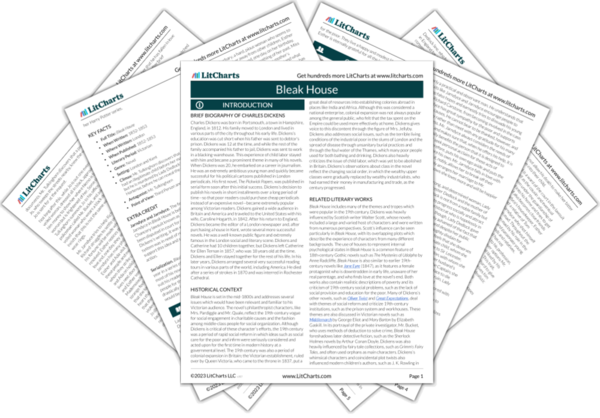Throughout Bleak House, houses represent the inner lives of the people who live in them. This was a trope which was common in both Victorian fiction and in the popular Gothic novels of the previous century, which influenced many 19th-century writers. For example, Mr. Jarndyce tells Esther that he has inherited Bleak House itself from Tom Jarndyce, and that the house was in a state of chaos and disrepair when it came to him. This reflects Tom Jarndyce’s madness, brought on by his involvement with Jarndyce and Jarndyce. The renovations and reparations which Mr. Jarndyce makes to the house reflects the restoration of order through Mr. Jarndyce’s calm, benevolent, and sensible personality. Mrs. Jellyby’s house too, reflects her inner life and is utterly neglected because her mind, and therefore her domestic activity, is used up elsewhere. Meanwhile, the new Bleak House, into which Esther and Mr. Woodcourt move is a beautiful den of flowers and growth, which represents the fruition and growth of their love and their pleasant future together.
Houses also take on their owners’ characteristics, in the form of ghosts or presences, which is demonstrated by Nemo’s room, which begins to feel haunted by the writer after his death there. Nemo’s room is a gloomy, decrepit room, which reflects the writer’s destitution and inner turmoil, and the horror and loneliness of his situation is conveyed to the reader through the description of the two windows which look into the bed and seem to be appalled by what they see. This is similarly demonstrated in the houses that belong to the Dedlocks, which take on the stiff, immovable, and yet outdated feel, of this seemingly immovable dynasty.
Houses Quotes in Bleak House
What should I have suffered, if I had had to write to him, and tell him that the poor face he had known as mine was quite gone from me, and that I freely released him from his bondage to one whom he had never seen!
‘I dread one person very much.’
‘An enemy?’
‘Not a friend. One who is too passionless to be either. He is Sir Leicester Dedlock’s lawyer; mechanically faithful without attachment, and very jealous of the profit, privilege, and reputation of being master of the mysteries of great houses.’
‘I am resolved. I have long outbidden folly with folly, pride with pride, scorn with scorn, insolence with insolence, and have outlived many vanities with many more. I will outlive this danger, and outdie it, if I can. It has closed around me, almost as awfully as if these woods of Chesney Wold had closed around the house; but my course through it is the same. I have but one: I can have but one.’
The way was paved here, like the terrace overhead, and my footsteps from being noiseless made an echoing sound upon the flags. Stopping to look at nothing, but seeing all I did see as I went, I was passing quickly on, and in a few moments should have passed the lighted window, when my echoing footsteps brought it suddenly into my mind that there was a dreadful truth in the legend of the Ghost’s Walk; that it was I, who was to bring calamity upon the stately house; and that my warning feet were haunting it even then.
Heaven knows what he sees. The green, green woods of Chesney Wold, the noble house, the pictures of his forefathers, strangers defacing them, officers of police coarsely handling his most precious heirlooms, thousands of fingers pointing at him, thousands of faces sneering at him. But if such shadows flit before him to his bewilderment, there is one other shadow which he can name with something like distinctness even yet, and to which alone he addresses his tearing of his white hair, and his extended arms.












